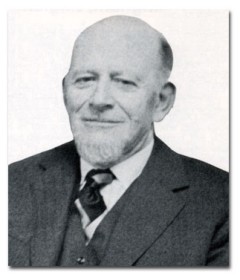Liberty Matters
Lachmann was a Hayekian
 I would like to elaborate on what it means to say Lachmann was a Hayekian. My earlier comments were unclear, which caused Peter Lewin to misunderstand me.
I would like to elaborate on what it means to say Lachmann was a Hayekian. My earlier comments were unclear, which caused Peter Lewin to misunderstand me.My point was not, as Peter writes, that Lachmann's "attention to the divergence of expectations (provoked by Hayek's 'Economics and Knowledge') came later and that this matter was, in some important sense, derivative of Lachmann's more fundamental subjectivism based in both Menger and Weber and related works." Rather it is that Lachmann's more fundamental subjectivism based primarily on Mises and Weber was provoked by Hayek's "Economics and Knowledge" (and the larger context from which it sprang), leading to rich story of intertemporal plan coordination of which divergent expectations were an integral part, but not the whole story.
So, I agree that the "expectations story" has had the most noticeable influence on his fellow Austrians. However, I believe this is a "thin" reading of Lachmann's contributions which has often resulted in a facile lumping together of Lachmann and Shackle.
Partly, I want to fill what I believe is a lacuna in the usual presentation of Lachmann's intellectual trajectory. Peter, in his lead essay, quotes from Mittermaier's informative biographical sketch of Lachmann. Mittermaier (1992, 9) notes that Lachmann was already a Hayekian upon his arrival at LSE. However, he goes on to explain that "being a Hayekian" had a narrower meaning back then -- referring to Austrian capital and trade-cycle theory. Similarly, Walter Grinder in his masterful overview of Lachmann's work (1977, 8) writes that by the time Lachmann arrived at LSE, his "basic theoretical formulation, with the possible exception of the role of changing expectations in economic life, had been worked out."
While I think there is truth in both of these claims, I also think they obscure the important impact that Lachmann's time at LSE had on his thinking. What they miss is that his (and Hayek's) work on capital, trade cycle, and expectations occurred as part of a broader debate over intertemporal equilibrium. This debate raised fundamental questions about the relationship between knowledge and time, what Giocoli (2003) calls the "escape from perfect foresight." I think this explains Lachmann's later, frequent references to Hicks, Shackle, and the post-Keynesians. It was not that they had the right answers, but that they were the only ones still asking the right questions – questions about time and ignorance.
My claim is that Hayek's reframing of this debate in terms of plan coordination and incomplete knowledge influenced Lachmann greatly, and most of his subsequent work can be seen as wrestling with the implications of this perspective. This, of course, does not mean that Lachmann agreed in all particulars with Hayek, but rather that the research program Lachmann pursued was very much a Hayekian one. For example, Lachmann ([1951] 1977, 101), in his review of Human Action, criticizes Mises in a way that echoes Hayek's criticism of Mises in "Economics and Knowledge": "if the transformation of knowledge is an essential element in the market process, then the latter cannot belong to the province of logical economics, for the acquisition of knowledge is not a logical process."
Yet Lachmann saw in the work of Mises and Weber a way out of this dilemma. While Lachmann knew of their work from his days in Berlin, it was only after his move to Johannesburg that he studied their work closely. And it was Mises with whom he always claimed to have the greatest philosophical affinity. It was Mises's subjective approach to means and ends (shared with Weber) and his view of the market as a process that Lachmann saw as the most fruitful avenues for advancement. His emphasis on "plans" and "real types" were an attempt to integrate the empirical with the logical.
So, yes, divergent expectations matter, but this is part of a larger story of knowledge transmission and intertemporal plan coordination, a story shared with Hayek. Hayek emphasized more the spatial challenges to plan coordination posed by dispersed knowledge. Lachmann emphasized more the temporal challenges to plan coordination posed by the unknown future. Both aspects matter.
Copyright and Fair Use Statement
“Liberty Matters” is the copyright of Liberty Fund, Inc. This material is put on line to further the educational goals of Liberty Fund, Inc. These essays and responses may be quoted and otherwise used under “fair use” provisions for educational and academic purposes. To reprint these essays in course booklets requires the prior permission of Liberty Fund, Inc. Please contact oll@libertyfund.org if you have any questions.